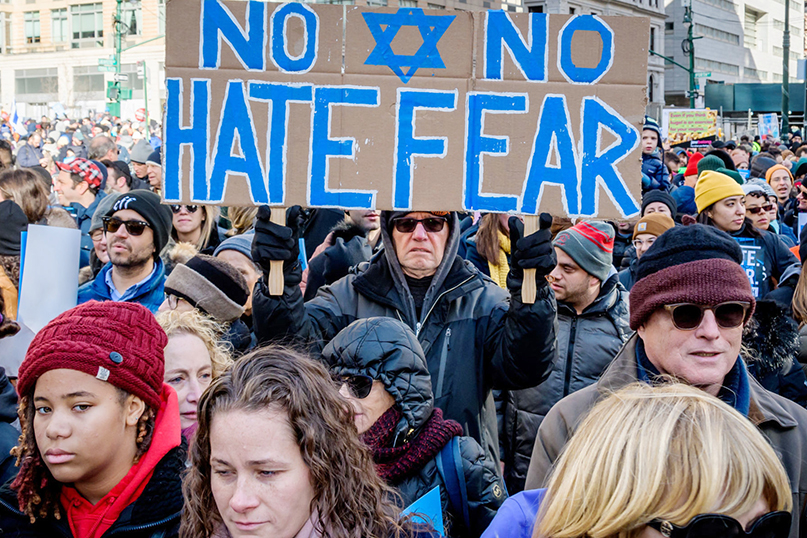
By Ben Sales
(JTA) – The number of antisemitic hate crimes in the United States increased significantly in 2019, according to the FBI, in a year that saw three lethal attacks against Jews.
Antisemitic incidents again comprised the majority of hate crimes based on religion. In addition, the number of hate crime murders overall more than doubled nationwide last year.
But the Anti-Defamation League cautioned that the FBI’s numbers probably represent just a fraction of total hate crimes committed in the country.
The FBI recorded 953 hate crimes against Jews in 2019, a 14% increase from the 835 recorded in 2018 and similar to the 938 in 2017. In 2019, hate crimes against Jews comprised 62% of all hate crimes based on religion, up from 58% in both of the previous two years.
Last year saw a series of lethal antisemitic attacks that sparked fear and anxiety among American Jews. A synagogue shooting in Poway, California, killed one person exactly six months after the October 2018 synagogue shooting in Pittsburgh in which 11 Jews were murdered.
In December, a shooting in Jersey City, New Jersey, that ended at a kosher supermarket killed two Jews and two others. Later that month, a stabbing at a Hanukkah party in Monsey, New York, killed one. The New York-area attacks came amid a spate of anti-semitic harassment and assaults in Orthodox neighborhoods in Brooklyn.
“The surge of hate in the last few years is unmistakable,” Jonathan Greenblatt, the CEO of the ADL, told the Jewish Telegraphic Agency on Monday. “We’ve been talking about our anxiety about the normalization of antisemitism, and sure enough in 2019 we saw a 14% increase in anti-Jewish hate crimes.”
Greenblatt said the antisemitic attacks of last year show that Jew-hatred transcends political allegiances. While he hopes “we’ll be able to hit a bit of a reset button” as Joe Biden prepares to enter the White House, he cautioned against attributing the rise in antisemitism solely to President Donald Trump.
“No one person is responsible for antisemitism,” he said. “There are those who want to pin this all on President Trump. I think that’s wrong. No one was wearing MAGA hats in Brooklyn last December when we saw a wave of assaults.”
The string of attacks last year came amid what the ADL has described as a years-long rise in antisemitic activity. Just days after 2020 began, 25,000 people marched across the Brooklyn Bridge to protest antisemitism in New York City and elsewhere.
Earlier this year, the ADL found, similarly to the FBI, that antisemitic incidents rose by 12% in 2019 to their highest number in 40 years (though its criteria differ from the FBI and the Jewish anti-bigotry agency has recorded a higher number of antisemitic incidents over the years).
The FBI recorded 7,314 total hate crimes last year, a slight increase over 2018 and 2017, but a sharp uptick from the 5,850 in 2015. As in previous years, the majority were based on race. African-Americans experienced the most hate crimes, 1,930. Hate crimes based on religion made up approximately 20% of total hate crimes.
Last year also saw a huge increase in hate crime murders, to 51 from 24 in 2018. That includes the mass shooting at a Walmart in El Paso, Texas, that killed 23 and wounded the same number. The shooter wrote in a manifesto that he was acting against a Hispanic “invasion.” Anti-Hispanic hate crimes, according to the FBI, rose 9% in 2019, the fourth straight year they’ve risen.
The ADL said the FBI numbers are almost certainly a significant undercount of the true number of hate crimes in the United States because many municipalities do not submit hate crime data to the FBI. According to the ADL, 86% of participating agencies reported no hate crimes to the FBI, including 71 cities with populations greater than 100,000 – though the largest cities tend to report their hate crime data. The ADL also said that the number of agencies reporting hate crimes to the FBI has declined each year.
“We have an incomplete picture,” Greenblatt said. “That being said, I think the trends over two decades are telling. Hate remains a reality for people from marginalized communities in this country, particularly Jews, who represent somewhere between 1.5 and 2% of the population and [experience] a disproportionate number of the hate crimes.”
Greenblatt said the ADL hopes the incoming Biden administration will support increased anti-bias education in schools and work on a plan to confront white nationalism.
“Extremists feel emboldened, and anti-Jewish conspiracy theories and anti-Jewish ideas generally are taking root,” he said. “Jews feel less safe. Jews are extremely worried about this.”
Main Photo: Thousands of New Yorkers convene at the “No Hate. No Fear” solidarity march against antisemitism in January 2020. The march followed a year in which attacks against Jews spiked. (Credit: Erik McGregor/LightRocket via Getty Images)








 Southern New England Jewish Ledger
Southern New England Jewish Ledger













